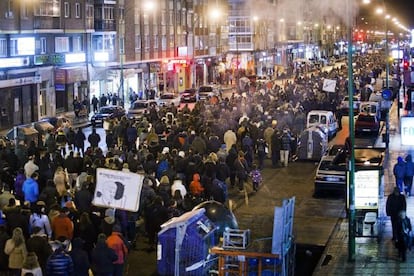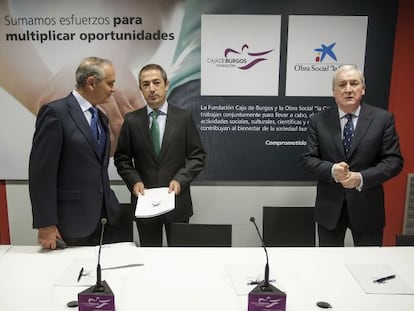Burgos protestors point to “The Boss”
Businessman Méndez Pozo believed to be true powerbroker in northern city Construction and media magnate plays down links to ruling Popular Party

When residents of the Burgos neighborhood of Gamonal took to the streets to protest a boulevard development project earlier this month, they marched right to the door of Antonio Miguel Méndez Pozo's business premises and pointed the finger of blame at him. It is noteworthy that locals did not take their protest to City Hall, or even to the headquarters of the Popular Party (PP), which rules this northern city. Instead, they went to the place where they feel that the decisions really get made.
Let us jump back to 1992. When asked by an attorney about his dealings with the PP, the businessman - who was still just a builder back then - replied the following: "Believe me, to this day I don't know where the PP headquarters in Burgos are located. I really have no clue where the front door is."
It may be that Méndez Pozo really did not know where the PP headquarters are, but every party member in Burgos and the entire region of Castilla y León knew perfectly well who Méndez Pozo was: "The Boss." There were good reasons to call him that, as evidenced by the ensuing trial - which was triggered by a complaint against Méndez Pozo filed by the Federation of Builders, an unheard-of step among people who are accustomed to resolving their own disputes internally.
In 1994 Méndez Pozo was sentenced to seven years in prison as a result of that trial, making him the first Spanish builder to be convicted for political corruption. Twenty years later, there is no sign that his behind-the-scenes power has diminished. The people of Gamonal felt that Méndez Pozo was the mind behind an eight-million-euro project to convert a street into a boulevard with a cycling path and an underground garage that would have eliminated free parking spots above.
In 1994 Méndez Pozo was sentenced to seven years in prison
Perhaps The Boss was right: he didn't need to know where the PP was headquartered, because everyone came to him instead."There was no obstacle, no matter how large, that could prevent Mr Méndez Pozo from convincing[a list of councilors and former mayor José María Peña] to resolve issues according to his own interests [...] while clearly and manifestly violating existing laws, in full awareness that they were doing so," reads the 1994 sentence against him.
Méndez Pozo spent just seven months behind bars, after which he devoted the next two decades to making everyone forget that it ever happened. Other entrepreneurs would have been ruined for life. But not Méndez Pozo. He just turned the page and moved on."If God wanted me to go in there, it is because He willed it so," he said in one of his rare public references to the prison episode. As soon as he was out again, he began buying up media outlets, securing institutional positions and making a flurry of public appearances.

At the height of this effort to clean his image, he was the owner or a shareholder in 62 companies, the publisher of seven newspapers, proprietor of a news agency, and had 50-percent control over the regional television station of Castilla y León. Not one day went by without a media mention of Méndez Pozo as a job creator or social benefactor. There was a photographer assigned to him full-time.
The "construction trial" uncovered The Boss's friendship with José María Aznar from the days when he was regional premier of Castilla y León, before going on to become PP leader and prime minister. Aznar testified in writing at the trial after being subpoenaed. The case also revealed how the mayor and other leading city officials systematically favored Méndez Pozo over other builders when it came to awarding projects or changing zoning regulations.
Despite the conviction, the Burgos power broker not only maintained his influence over the regional branch of the PP, but he also made new friends among the Socialists of another large Spanish region, Castilla-La Mancha, where he opened three newspapers and became one of the masterminds of the much-derided airport of Ciudad Real, which opened in December 2008, had an average of two flights a day in 2010 and was completely shut down in 2012.
But the headlines published by his own media outlets told of a success story: "Méndez Pozo encourages businesses to be role models of good management," "Méndez Pozo brings back an El Greco to the people of Burgos..." And all the while, he piled on the awards and positions: he became the president of the Burgos Chamber of Commerce, president of the Silos Foundation, a cultural association linked to the Monastery of Santo Domingo de Silos (whose monks released a best-selling album of Gregorian chants in 1994), and president of the Atapuerca Foundation, which manages the famous archeology and paleontology site.
We didn't actually rape the way he did"
These days, however, his power is exerted in much more subtle ways. It used to be that The Boss would kick his rivals out of town, just like in the Westerns that he is so fond of. "We believed at one point that we had something like a droit de seigneur ," confesses one retired builder who belongs to one of most traditional developer families in Burgos. "But we didn't actually rape the way he did."
An architectural technologist by trade, Méndez Pozo entered the construction business as a young upstart who soon figured out how public contracts were handed out. "In Castilla y León, large companies always bid hand-in-hand with a local company. The latter was there to resolve the political side of the equation," notes one developer. Méndez Pozo, who refused to talk to EL PAÍS, soon knew his way around bidding and zoning. Burgos is full of examples of nine-story buildings whose licenses only allowed for eight floors.
The Gamonal boulevard project does not look like a Méndez Pozo project, but in some way it is: it was promoted by a project company he owns, MGB, and extolled as necessary by the Diario de Burgos newspaper, which he owns.His biographers describe him as a lover of opera, of Don Quixote and of antiques - three very respectable hobbies in this conservative society. In the last 20 years, Méndez Pozo has been working hard to be seen as a respectable man - and a respected one to boot. To this day, many entrepreneurs know it is best to deal with him carefully.
"It's not a good idea to get on the wrong side of him," says one. "You could start showing up in his newspapers."
Tu suscripción se está usando en otro dispositivo
¿Quieres añadir otro usuario a tu suscripción?
Si continúas leyendo en este dispositivo, no se podrá leer en el otro.
FlechaTu suscripción se está usando en otro dispositivo y solo puedes acceder a EL PAÍS desde un dispositivo a la vez.
Si quieres compartir tu cuenta, cambia tu suscripción a la modalidad Premium, así podrás añadir otro usuario. Cada uno accederá con su propia cuenta de email, lo que os permitirá personalizar vuestra experiencia en EL PAÍS.
¿Tienes una suscripción de empresa? Accede aquí para contratar más cuentas.
En el caso de no saber quién está usando tu cuenta, te recomendamos cambiar tu contraseña aquí.
Si decides continuar compartiendo tu cuenta, este mensaje se mostrará en tu dispositivo y en el de la otra persona que está usando tu cuenta de forma indefinida, afectando a tu experiencia de lectura. Puedes consultar aquí los términos y condiciones de la suscripción digital.









































